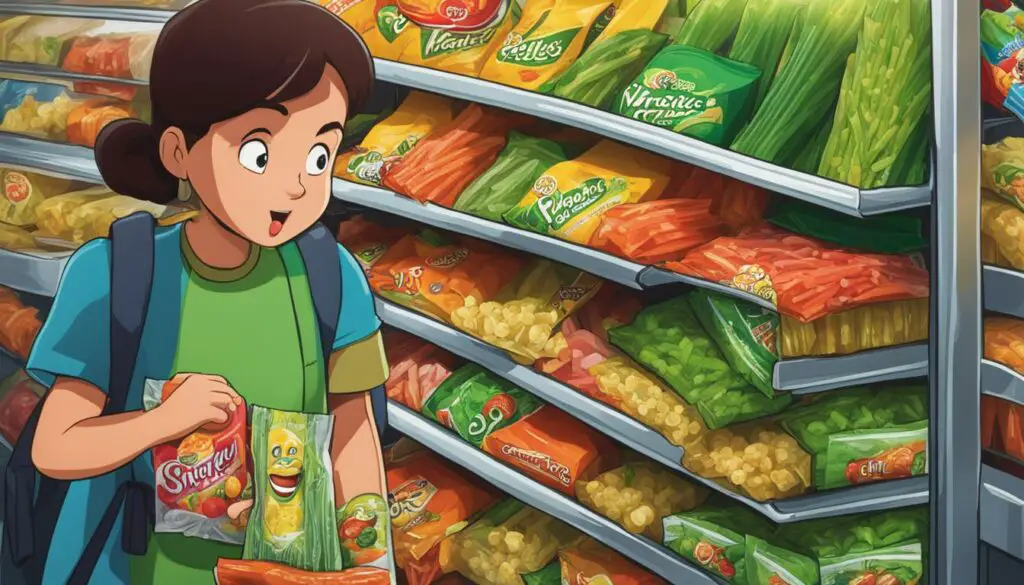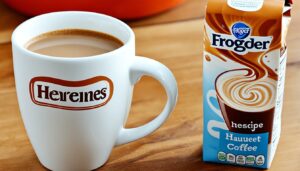Originally posted on January 12, 2024 @ 4:13 am
A recent class action lawsuit has raised questions regarding the recipe of Good Health Veggie Straws. The lawsuit alleges that the snacks have undergone a recipe change, leading to concerns about their ingredient composition and potential misleading marketing. Let’s delve into the details to understand whether the recipe of Veggie Straws has truly been altered.
Contents
- 1 What Were the Old Ingredients?
- 2 Why Did Good Health Veggie Straws Change Their Recipe?
- 3 Is the New Recipe Misleading?
- 4 Potential Violation of Federal Regulations
- 5 What Damages Are Being Sought?
- 6 The Lawsuit and Legal Representation
- 7 Conclusion
- 8 FAQ
- 8.1 Did Veggie Straws Change Their Recipe?
- 8.2 What Were the Old Ingredients?
- 8.3 Why Did Good Health Veggie Straws Change Their Recipe?
- 8.4 Is the New Recipe Misleading?
- 8.5 Potential Violation of Federal Regulations?
- 8.6 Who Is Affected by the Alleged Recipe Change?
- 8.7 What Damages Are Being Sought?
- 8.8 The Lawsuit and Legal Representation?
- 8.9 Conclusion
- 9 Source Links
Key Takeaways:
- Good Health Veggie Straws face allegations of a recipe change and misleading marketing.
- The old ingredient list included a proprietary blend of vegetables.
- The alleged recipe change may have resulted in the use of a synthetic source of vitamins.
- The misleading labeling could misrepresent the snack’s actual nutrient content.
- A class action lawsuit seeks to represent affected consumers and seek compensation.
What Were the Old Ingredients?
Before the alleged recipe change, the ingredient list for Good Health Veggie Straws included a proprietary blend of vegetables. These vegetables were infused in the snacks through a proprietary processing method, which gave them their nutrient content. The old ingredient list included:
- Spinach
- Broccoli
- Carrot
- Tomato
- Beet
- Shiitake mushroom
This unique combination of vegetables provided the snacks with a natural and flavorful taste, promoting them as a healthy alternative for consumers. The proprietary processing method ensured that the nutrients from these vegetables were integrated into the Veggie Straws, creating a nutrient vegetable blend.
To illustrate the nutritional value of the snacks, the old ingredient list was used to claim that each serving of Veggie Straws had the equivalent vitamins of:
- 2.5 cups of broccoli
- 3.5 beets
- 5 tomatoes
- 7 cups of spinach
- 2 carrots
This information further enhanced the perception of Veggie Straws as a nutritious snack option.

Why Did Good Health Veggie Straws Change Their Recipe?
The alleged recipe change in Good Health Veggie Straws raises questions about the company’s motives and decision-making process. According to the lawsuit, the change was a calculated decision to secure higher profits. By continuing to use the old ingredient list, which included the nutrient vegetable blend, the snacks could be sold at a higher price, giving the impression of naturally derived vegetable nutrients.
However, the alleged recipe update involved a shift towards using a synthetic source of vitamins, allowing for cost savings and potentially increased profit margins. This decision, if proven true, raises concerns about the transparency and honesty of Good Health’s marketing practices.
In order to understand the full impact of the recipe change on the product’s nutritional value and consumers’ perception, it is important to analyze the underlying motivations and strategies employed by Good Health.
Is the New Recipe Misleading?
The lawsuit claims that the new recipe and continued use of the old ingredient list is misleading to consumers. The snacks are promoted as a healthy snack alternative, claiming to have vegetable-derived nutrients and being beneficial to consumers’ health. However, with the alleged recipe change, the snacks no longer contain the nutrient vegetable blend as listed on the old ingredient list. The vitamins are now derived from a synthetic source, which is not vegetable-derived. This deceptive marketing could lead consumers to believe they are purchasing a healthier product than they actually are.
In fact, the misleading label and false information about the ingredients misportray the true nature of Good Health Veggie Straws. Consumers who rely on the old ingredient list may not be aware of the change in the recipe, resulting in deceptive marketing practices.
“By using the old ingredient list despite the alleged recipe change, the snacks may not accurately represent their actual nutrient content, leading to false or misleading information on the label.” – Class Action Lawsuit
This deceptive marketing technique has the potential to misguide consumers who prioritize vegetable-derived nutrients and make health-conscious choices. The alleged recipe change raises questions about the integrity of Good Health Veggie Straws and their commitment to providing accurate information to their customers.
| Misleading Label | False Information | Deceptive Marketing |
|---|---|---|
| Claims to have vegetable-derived nutrients | No longer contains the nutrient vegetable blend as listed | Leads consumers to believe they are purchasing a healthier product |
| Promotes as a healthy snack alternative | Vitamins are now derived from a synthetic source | Misrepresents the true nature of the snacks |
This deceptive marketing strategy violates consumers’ trust and undermines their ability to make informed choices about the products they purchase. The alleged recipe change and continued use of the old ingredient list create a misleading perception that Good Health Veggie Straws still contain the nutrient vegetable blend when they do not.
Consumers deserve accurate and transparent information about the products they consume, especially when it pertains to their health. The deceptive marketing practices associated with the new recipe of Good Health Veggie Straws highlight the need for increased scrutiny and regulation to protect consumers from false or misleading labeling.

Potential Violation of Federal Regulations
The class action lawsuit against Good Health Veggie Straws alleges that the company’s misleading labeling may be a potential violation of federal regulations, including the Food Drug & Cosmetic Act (FDCA). The FDCA is a key legislation that governs the labeling of food products in the United States, specifically prohibiting false or misleading labeling.
Under the FDCA, a food product can be considered “misbranded” if its labeling contains false or misleading information. This includes claims, statements, or representations that are deceptive or likely to deceive the consumer in any way. It is essential for companies to provide accurate and transparent information on their product labels to ensure consumer trust and safety.
In the case of Good Health Veggie Straws, the lawsuit alleges that the company continued to use the old ingredient list, which included the nutrient vegetable blend, despite a recipe change. This may result in the snacks not accurately representing their actual nutrient content, potentially leading to false or misleading information on the label.
Using the old ingredient list despite the alleged recipe change could potentially mislead consumers regarding the actual composition of the product. This violates federal regulations and undermines consumer trust in the brand.
If the allegations are proven true, Good Health Veggie Straws may be held accountable for misbranded labeling and face consequences under the FDCA. The purpose of these regulations is to protect consumers from deceptive marketing practices and ensure they have access to accurate information about the products they purchase.
FDCA and Misleading Labeling
The Food Drug & Cosmetic Act (FDCA) is a federal law designed to protect consumers from misbranded or adulterated food, drugs, and cosmetics. It empowers the U.S. Food and Drug Administration (FDA) to enforce regulations related to product labeling, safety, and effectiveness.
Specifically, the FDCA defines misbranding as the act of introducing a product into interstate commerce that has false or misleading labeling. Labeling includes any written, printed, or graphic material displayed on a product label or accompanying it, as well as marketing materials and advertisements.
Misbranded food products can pose risks to consumer health and safety by providing inaccurate information or hiding important facts about the product’s composition, nutritional content, or potential allergens. The FDCA aims to ensure that consumers are not misled by false or deceptive marketing claims and have the necessary information to make informed choices about the products they consume.
The allegations against Good Health Veggie Straws suggest a potential violation of the FDCA due to the continued use of the old ingredient list, which may mislead consumers about the product’s nutrient content. If proven, this could have significant legal implications for the company, including penalties, recalls, and reputational damage.
Impact of Misbranded Labeling
Misbranded labeling can have serious consequences for both consumers and companies. Consumers rely on accurate and transparent product labeling to make informed choices about the foods they purchase and consume, especially when it comes to health-related claims.
When a product is misbranded, consumers may unknowingly consume ingredients they wish to avoid or overestimate the nutritional value of the product. This can impact their dietary choices, health outcomes, and overall trust in food brands.
For companies, misbranded labeling can result in legal consequences, including fines, recalls, and damage to brand reputation. It undermines consumer trust and can have long-term financial implications.
Ensuring compliance with federal regulations, such as the FDCA, is crucial for companies to maintain consumer trust, protect public health, and avoid potential legal consequences.
| Consequences of Misbranded Labeling | |
|---|---|
| 1 | Fines and Penalties |
| 2 | Recalls and Product Discontinuation |
| 3 | Damage to Brand Reputation |
| 4 | Loss of Consumer Trust |
| 5 | Potential Legal Action from Consumers |
Companies should prioritize compliance with federal regulations, including accurate and transparent labeling, to maintain consumer trust, mitigate legal risks, and uphold their commitment to consumer safety and satisfaction.

Consumers across the United States who have purchased Good Health Veggie Straws since January 1, 2017, may have been affected by the alleged recipe change. If you have bought these snacks, it’s essential to understand your rights and seek compensation if you believe you have been misled by the branding and labeling.
Examples of Potentially Affected Consumers
| Category | Examples |
|---|---|
| Purchase Channels |
|
| Consumer Groups |
|
| Geographic Locations |
|
If you belong to any of these categories or have purchased Good Health Veggie Straws since January 1, 2017, you may be eligible to participate in the class action lawsuit seeking compensation for the alleged misleading marketing and deceptive labeling practices. Stay informed about the progress of the lawsuit and consider joining to protect your consumer rights.
What Damages Are Being Sought?
The plaintiff in the class action lawsuit is seeking various damages to hold Good Health accountable for their alleged misleading marketing and to recover any financial losses incurred by the consumers. The damages being sought include:
- Compensatory damages: These are intended to compensate the consumers for any actual financial losses or harm they have suffered as a result of purchasing the allegedly mislabeled Good Health Veggie Straws.
- Treble damages: This is a legal remedy that triples the amount of actual damages awarded to the plaintiffs. The aim is to provide a stronger deterrent against similar misleading marketing practices in the future.
- Punitive damages: Punitive damages are sought to punish the defendant, Good Health, for their alleged deceptive practices and to deter them from engaging in such conduct again.
- Restitution: Restitution refers to the return of any financial losses incurred by the consumers. This would aim to restore them to their original state before the alleged mislabeling.
- Court costs: The plaintiff is seeking reimbursement for the expenses incurred during the legal proceedings, such as filing fees and other court-related costs.
- Attorneys’ fees: The plaintiffs are also seeking reimbursement for the legal fees incurred in pursuing the class action lawsuit against Good Health.
The overall objective of seeking these damages is to ensure that consumers who have purchased the Good Health Veggie Straws are fairly compensated for any financial losses they have suffered and to hold the company accountable for their alleged misleading marketing practices.
The Lawsuit and Legal Representation
The class action lawsuit against Good Health Veggie Straws is being represented by Joshua S. Bauchner and Michael H. Ansell of the law firm Ansell Grimm & Aaron PC. The lawsuit, filed in the U.S. District Court for the Southern District of New York, seeks to bring attention to the alleged recipe change and misleading marketing practices of the company. The legal team will advocate on behalf of consumers to seek compensation and ensure that Good Health is held accountable for their actions.
If you have purchased Good Health Veggie Straws since January 1, 2017, you may be affected by this class action lawsuit. The representation provided by Ansell Grimm & Aaron PC aims to protect the rights of consumers and pursue justice against deceptive marketing practices. By joining the lawsuit, you can contribute to holding Good Health accountable for their alleged misconduct and potentially receive compensation for any damages incurred.
Conclusion
As the class action lawsuit against Good Health Veggie Straws unfolds, it brings attention to the alleged recipe change and potential misleading marketing practices of the company. For consumers who have purchased these snacks since January 1, 2017, this lawsuit is an opportunity to seek compensation and hold Good Health accountable for their actions.
If you have noticed a difference in the taste or flavor of Veggie Straws and believe that the recipe may have changed, joining the class action could provide a voice for your concerns. Together, we can challenge deceptive marketing practices and ensure that companies accurately represent their products.
Stay updated on the progress of the lawsuit to learn about the outcome and any potential changes to the recipe of Good Health Veggie Straws. Your participation in the class action can contribute to a fair resolution and future transparency in the food industry.
FAQ
Did Veggie Straws Change Their Recipe?
Yes, there are allegations that the recipe for Veggie Straws has been changed.
What Were the Old Ingredients?
The old ingredients included a proprietary blend of vegetables: spinach, broccoli, carrot, tomato, beet, and shiitake mushroom.
Why Did Good Health Veggie Straws Change Their Recipe?
It is alleged that the recipe change was a calculated decision to secure higher profits.
Is the New Recipe Misleading?
The new recipe and continued use of the old ingredient list are claimed to be misleading to consumers.
Potential Violation of Federal Regulations?
The lawsuit claims that the alleged misleading labeling may violate federal regulations, including the Food Drug & Cosmetic Act (FDCA).
Who Is Affected by the Alleged Recipe Change?
Consumers in the United States who purchased Veggie Straws since January 1, 2017, may be affected.
What Damages Are Being Sought?
The class action lawsuit seeks compensatory damages, treble damages, punitive damages, restitution, court costs, and attorneys’ fees.
The Lawsuit and Legal Representation?
The lawsuit against Good Health Veggie Straws is being represented by Ansell Grimm & Aaron PC.
Conclusion
Stay updated on the progress of the class action lawsuit to learn more about the alleged recipe change and any potential impacts on the taste of Veggie Straws.








